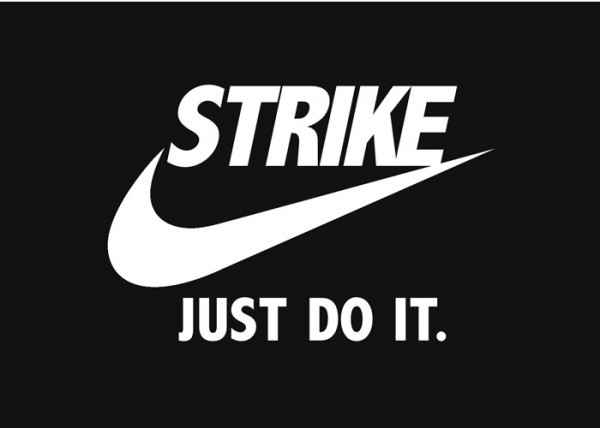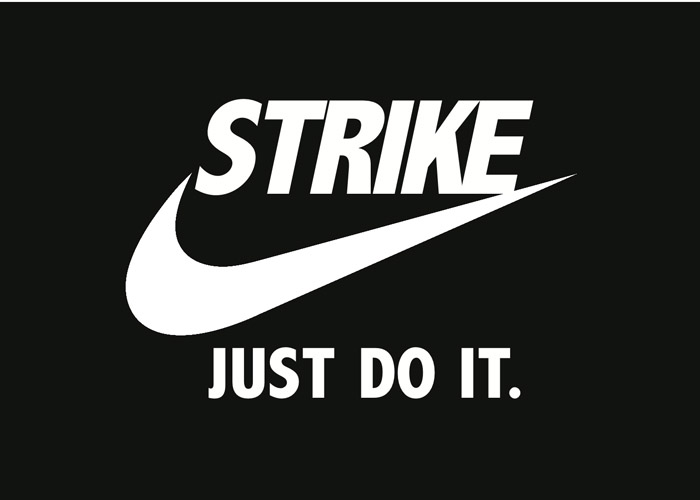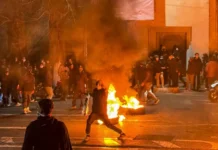40,000 workers paralyse production at world’s largest sports shoe maker as labour disputes soar in China
chinaworker.info reporters
Workers at six out of ten factories in Dongguan owned by Taiwanese multinational Yue Yuen have been on strike for the past three days after discovering the company has not been paying legally required levels of social security and housing contributions.
“The factory has been tricking us for 10 years,” a woman worker told Reuters. “The [local] Gaobu government, labour bureau, social security bureau and the company were all tricking us together.”
“Many of us began to find out our social insurance contribution from our employers were at least 200 yuan short every month, dating back nearly two decades,” another worker told Hong Kong’s South China Morning Post.
Upsurge in strikes
The strike is emblematic of a new wave of labour struggles especially in Guangdong, where Dongguan is located, and other developed regions of China. Samsung, Lenovo, Nokia and Wal-Mart are among the companies hit by recent stoppages. Strikes are up by almost one-third in the first quarter of 2014 compared to the same period last year according to research by China Labour Bulletin, a Hong Kong-based NGO. The group’s findings also reveal “a more forceful response from the local authorities,” with a 4-fold increase in police interventions and a sharp rise in arrests. This trend is confirmed by recent trials of worker activists and strike organisers.
Dongguan, known as “the world’s factory,” has a workforce of around 10 million. In recent years it has been badly hit by the global crisis and downturn in China’s traditional export markets. The city has experienced several large strikes over severance pay, wage arrears and non-payment of so-called fringe benefits. This includes an earlier strike at Yue Yuen, in 2011, when around 7,000 workers fought against layoffs and wage cuts.
The latest Yue Yuen strike is “massive” to quote the Chinese dictatorship’s normally hardline mouthpiece Global Times, involving tens of thousands of workers. Media reports give contradictory figures, with some saying 10,000 are on strike while other reports put the numbers far higher. This is to be expected given the fog of official censorship, while strikes are of course illegal in China. According to NGO activist Zhang Zhiru, who is in contact with strike organisers, more than 30,000 workers went on strike on Monday 14 April, with more joining on Tuesday. The Global Times, which presumably has its own sources within the security agencies, also puts the number of strikers at 40,000.
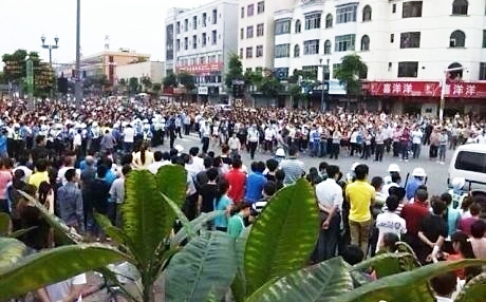
“Illegal activities”
Yue Yuen (part of Taiwan’s Pou Chen Group) is to footwear what Foxconn is to electronics. Its website boasts it is “the world’s largest branded footwear manufacturer” churning out 300 million pairs of shoes a year for Nike, Adidas, Reebok, ASICS, New Balance, Puma, Converse, Salomon and Timberland among others (Yes, consumers, they’re all made by the same people!)
In recent years Yue Yuen has been cutting back in China and shifting production to Indonesia and Vietnam where wages are lower. As companies move offshore or to lower-wage provinces within China there has been a sharp rise in workers’ protests over severance pay and cost-cutting measures by management.
All companies are supposed under Chinese law to pay full mandatory social insurance for workers – including pensions, medical insurance, housing allowances and injury compensation. Recent legal reforms allowing migrant workers to transfer these payments when they relocate to other cities has led workers to pay closer attention to how companies fulfil these obligations. A study by US-based China Labor Watch found that none of its survey group of 400 companies had paid the full amount of mandatory social insurance. So the problems facing the Yue Yuen workers – corporate evasion of social security contributions – are endemic across manufacturing industry.
“Some of my colleagues estimate that Yue Yuen owes the workers as much as one billion yuan over the years,” a mid-level manager told China Labour Bulletin
The Yue Yuen strike began on 5 April, when hundreds of workers staged a protest action by blocking a nearby bridge. The company promised to resolve the issues, but its later offer failed to meet workers’ demands which led to a resumption of the strike on 14 April. Thousands took part in a protest march behind a banner that proclaimed, “Pay back the social security and public housing fund! Shame on Yue Yuen’s illegal activities!”
The government has drafted in around 2,000 police from cities including Guangzhou and Zhuhai. Around 20 strikers were arrested at this demo, according to eyewitnesses, who also said that some workers who held banners had been beaten. One worker told Radio Free Asia that some strikers had been hospitalised following clashes with the riot police. Significantly, but replicating a pattern seen elsewhere, police repression seems to have hardened the resolve of the workers, with reports of strike numbers growing afterwards. The next days will be decisive, after Yue Yuen management issued an ultimatum that any worker who did not return to work within three days could face dismissal.
Workers have used social media as an important tool to build the strike, again replicating a trend seen in other strikes and mass protests in China. Thousands joined an online QQ group in the days before the first protest organised on 5 April, according to one Yue Yuen worker. This forum was closed down by the authorities, but workers set up several new ones and the numbers joining have risen.
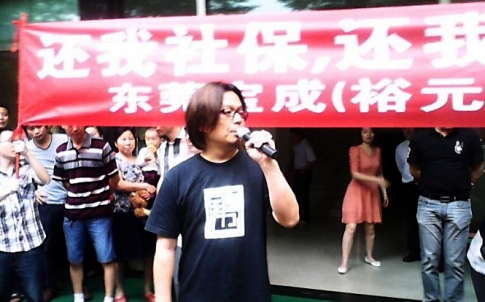
Increasing repression
As the Yue Yuen strike erupted, a court in Guangzhou, the provincial capital, found 11 security guards guilty of “gathering a crowd to disrupt public order” for their part in a long-running strike last year at the Guangzhou Chinese Medicine University Hospital. The Financial Times correctly described the trial as a “test case of the government’s intolerance towards a recent surge in labour activism.”
For more background see Free Wu Guijun! Free Guangzhou 12!
Six of the defendants were sentenced to 8-month jail terms, meaning they will be released this week based on time already served. Three others were jailed for nine months. Perversely, the court in Guangzhou is seen as showing leniency, given that the charge of “gathering a crowd to disrupt public order” carries a maximum penalty of five years in prison. This is the same charge used to jail anti-corruption activist Xu Zhiyong for four years at a trial in January, on equally spurious grounds. Ten other members of Xu’s New Citizens’ Movement have either been jailed or are facing trial on the same charge.
Another important trial will soon reach a verdict, that of Wu Guijun, the 41-year-old workers’ leader who similarly stands accused of public order offences in connection with a strike at the Hong Kong-owned Diweixin Product Factory in Shenzhen. This case has generated a wave of international protests because it is seen as a symptomatic of a harder government line to criminalise workers’ protests and strikes. Members of the Committee for a Workers’ International (CWI) and the chinaworker.info website organised simultaneous protests in support of Wu at China’s embassies and consulates in Bangalore, Berlin, Sao Paolo, Sydney, and nine other cities last year.
“If there is any trace of justice then Wu Guijun cannot be found guilty,” his lawyer said as the trial resumed on 4 April. Wu has already spent over 300 days in detention; accused of leading a demonstration last May that blocked traffic, despite several workers testifying in court that Wu actually opposed this action. The campaign for Wu to be freed continues. China Labour Bulletin reports that Wu’s son and supporters set up an online petition that has been re-tweeted more than 12,000 times.
Build real workers’ unions
Despite the regime’s increasing resort to repression and arrests, the rising tide of strikes shows not only the will to fight on the part of Chinese workers, but also a clear trend towards more sophisticated organisation and tactics. Workers’ expectations are also rising. Online posts by striking Yue Yuen workers criticise the role of the official company-controlled trade union and demand the right to elect their own union representatives. This is an unstoppable process of workers struggling to build their own independent organisations in order to fight capitalist exploitation and the chains imposed upon the working masses by a dictatorial police state. Workers and trade unionists around the world should give maximum support to these struggles in “the world’s factory!”
